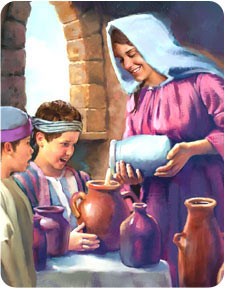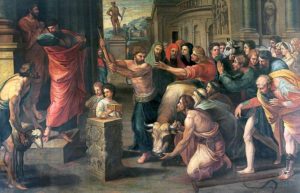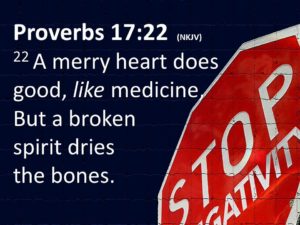TODAY’S READING FROM THE OLD TESTAMENT- 2 Kings 3:1-4:17; 
The sins of the Kings of Israel are often compared to the benchmark of “the sin of Jeroboam” which was the self-styled, ‘have it your way religion’ allowing for all kinds of idolatry, especially Baal worship.
Joram (Jehoram), the son of Ahab, becomes king of Israel and continues to do evil in the sight of the Lord, but not as his father and mother had done. Even though Joram removes one of the more prominent sacred monuments to Baal, he allows the false religious center and priesthood invented by Jeroboam to remain intact. His great sin is that he has no regard for God’s self-revelation through the Word.
When the King of Moab rebels against Israel, refusing to pay the required tribute, Joram, without any inclination to consult the Lord, recruits Jehoshaphat, the king of Judah, and the King of Edom, to attack. It is Jehoshaphat who asks Joram to seek God’s mind, through the prophet Elisha. You get the idea that Elisha and the king of Israel are not on good speaking terms. But Jehoshaphat was still desiring to find out God’s will. Elisha will only prophesy because he had respect for Jehoshaphat’s willingness to inquire of the Lord.
Elisha calls for a musician, a harpist, to play music while the Holy Spirit comes upon him to give revelation. The Lord would do a miracle, but they had to do the prep work of digging ditches. The Lord would fill the ditches with water and when the morning sun is reflected on it, it would appear to be pools of blood. This image gave the impression to the enemy that the armies of the three kings had attacked each other. It foreshadows the defeat of the enemy through the Light of God’s Word reflecting the redemptive value of the atoning blood of Christ through the water of the Word (Revelation 12:11). Presuming victory, the Moabites rush in to get the plunder only to find the Israelites ready to rise up and slaughter them and devastate their land.
The darkness of the period becomes evident when the King of Moab offers his firstborn son on the city wall to his pagan god, Chemosh.
Elisha offers help to a poor indebted widow whose creditors are threatening to take away her two sons as slaves. He miraculously provides for her practical need by first asking, ‘What do you have in your house?”
This is a good reminder to take stock of the fact that God is willing to use what He has already given us. He can do a miracle with our current subject matter–what we have ‘in our house’. In her case she said, “I have nothing ‘except a little oil’ (2 Kings 4:2).
Elisha then instructs her to borrow empty jars of every size and shape from her neighbors. Behind closed doors the woman is told to pour out her oil into the empty borrowed vessels. She found out that the Lord was able to fill every vessel she borrowed. The flow of oil only stopped when all the available jars were full. God’s supply was abundantly sufficient. She was then told by Elisha to sell the oil in the many vessels and she would be able to pay all her debts and that she and her sons could live on the rest!
What a wonderful picture of the ever- sufficient provisions of God’s grace available to the believer!
2 Corinthians 9:8 8 And God is able to make all grace abound to you, so that always having all sufficiency in everything, you may have an abundance for every good deed.
Elisha returns the kindness of a Shunamite couple who made a small room for him to live in by praying for their infertility. Within a year’s time the Shunamite couple had a baby boy.
TODAY’S READING FROM THE NEW TESTAMENT – Acts 14:8-28
Paul and Barnabas are preaching in Lystra, (in the Roman province of Galatia, modern Turkey) when a man lame from birth hears the gospel and believes in the Name of the Lord Jesus (Acts 14:9; Romans 10:17). Paul looks at him and perceives that he has faith to be healed. He calls out, “Stand up on your feet!” The man jumps up and walks.
So far, we have seen in the New Testament that God can heal anyone He wants to. He can heal when faith rests in the one being used by Jesus to effect the healing (Acts 3) or the one needing to be healed (Acts 14). In John 5 Jesus healed a discouraged lame man who had no faith that he would be healed. We should pray for the sick knowing that God is all-powerful and works all things according to the counsel of His will.
When the people of Lystra see this miracle, they interpret it in the context of their folk religion based on Roman mythology. In their mythology the gods would occasionally come down in human form. There was a legend that Zeus and Hermes had come to this region in the past and were rejected by the populace, with the exception of an elderly couple. That couple was later rewarded for their hospitality while the general populace was punished. These people mistakenly believed that Barnabas was Zeus and Paul was Hermes (the messenger god) because he was the chief speaker.
Rather than being flattered by the attention and high honors bestowed upon them, Paul and Barnabas were quick to correct this newfound celebrity worship. They tore their clothes and clarified that they were mere men who had the gracious experience of knowing God, the Creator of heaven and earth, personally. Yet in spite of their efforts to deflect their attention away from themselves to the only true God, they had difficulty keeping the crowd from sacrificing to them. Jews from Antioch and Iconium stir up the crowd against them. They stone Paul and drag him out of the city, thinking he is dead.
What we read next is a powerful testimony of Paul’s dedication and resilience in Christ.
Acts 14:20 20 But while the disciples stood around him, he got up and entered the city. The next day he went away with Barnabas to Derbe.
He returned to Lystra once again to give believers ‘follow-up treatment’:
Acts 14:22 22 strengthening the souls of the disciples, encouraging them to continue in the faith, and saying, “Through many tribulations we must enter the kingdom of God.”
We see an important part of his job as a disciple-making, church-planting missionary:
Acts 14:23 23 When they had appointed elders for them in every church, having prayed with fasting, they commended them to the Lord in whom they had believed.
The first missionary journey comes to a conclusion with Paul and Barnabas traveling back to the sending-church in Antioch where they reported “all that God had done through them and how he had opened the door of faith to the Gentiles.” (Acts 14:27)
TODAY’S READING FROM THE BOOK OF PSALMS- PSALM 140:1-13
The Psalmist finds himself surrounded by ‘evil’ ‘men of violence’, and those who wish him harm and plan for his downfall (v.1). He is the object of verbal attacks (v.2). He prays for rescue (v.1), protection, deliverance (v.7), and vindication (v. 9). He expresses confidence in God’s impeccable sense of justice (v.12) but also calls out for His Sovereign mercy (v.6).
The last verse underscores the hope that the gospel gives to all “in Christ ones”:
Psalm 140:13 13 Surely the righteous will give thanks to Your name; The upright will dwell in Your presence.
TODAY’S READING FROM THE BOOK OF PROVERBS- Proverbs 17:22
Proverbs 17:22 22 A joyful heart is good medicine, but a broken spirit dries up the bones.
PRAY FOR THE NATIONS
We continue to pray for India today. You can get updated information with the Operation World Prayer App.
http://www.operationworld.org/prayer-app/
PRAYER: Lord, You are our rescuer, deliverer, protector, vindicator and the merciful forgiver of our sins. Thank You for the cross of Jesus where You provide a mercy seat for guilty sinners who deserve condemnation at the judgment seat. We can rest secure knowing that in Christ we can dwell in Your presence.
Thank You for giving us the assurance that You can do miracles for us, in us and through us. We have a sufficiency in You that cannot be exhausted as long as there are vessels available to You. Be glorified as we grow in Your abounding grace, knowing that You have an ample supply for every need. In Jesus’ Name. Amen.
-Pastor David
